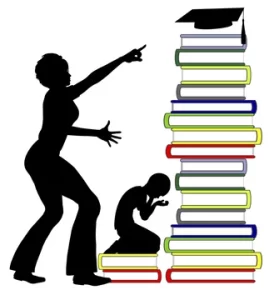 Ahead of Children’s Day, the axis of the trio – Parents, Teachers and Experts weigh in to deliberate and formulate their views on present day challenges posited towards children and their shared goal of children’s mental well-being, writes Esha Chaudhuri
Ahead of Children’s Day, the axis of the trio – Parents, Teachers and Experts weigh in to deliberate and formulate their views on present day challenges posited towards children and their shared goal of children’s mental well-being, writes Esha Chaudhuri
As we inch closer to one of the most coveted days; Children’s Day, Sunday Shillong ponders over some of the most talked about issues amongst children (across age groups) affecting their mental health. Diving deep into deliberations with their caregivers, mentors and counsellors/psychotherapists, the comprehension is all the more solidified about its many facets. Some of the most identifiable causal constitutive elements are pressures of performance, corrective measures to discipline and the exposure to internet and social media. As the deliberation mushrooms, the trio contemplates on how to raise awareness on the issue of mental health, nuanced forms of parenting and reimagined mentoring for improvised pay-off through our children.
Performance, achievements and pressures
 The onus of performance on students in areas of academia, sports, extracurricular activities, and its resultant pressures can often be daunting on students. The system of rote examinations and its innate stress on students is pervasive, increasing issues of result oriented anxiety, exacerbated by cutthroat competition with high stakes. Data presented by the National Crime Records Bureau (NCRB) corroborates this trend, with the number of student suicides rising from 6,654 in 2013 to 13,044 in 2022.
The onus of performance on students in areas of academia, sports, extracurricular activities, and its resultant pressures can often be daunting on students. The system of rote examinations and its innate stress on students is pervasive, increasing issues of result oriented anxiety, exacerbated by cutthroat competition with high stakes. Data presented by the National Crime Records Bureau (NCRB) corroborates this trend, with the number of student suicides rising from 6,654 in 2013 to 13,044 in 2022.
Working on causes related to children and their well-being, Project Coordinator for Child Friendly Shillong, under Bosco Integrated Development Society (BIDS), Dee Gurung observes, “ I have seen that now children come back from school and immediately leave for tuition, leaving them with no time to socialise or pursue hobbies that can develop qualities and thus creating a vacuum in a child’s life.”
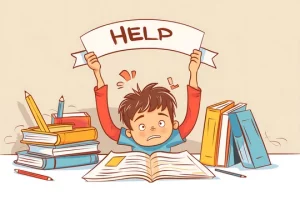 Mother to an 11-year-old and Asst. Professor at NEHU, Dr.Kuheli Biswas Das says, “Studies should not be a burden. It has to be enjoyed. Pressure should find no place.” Dr. Das, who operates with a teacher’s experience and mother’s vision, speaks from her own experiential perspective, “Division of time is necessary – dividing them for academics, games, and extracurricular activities. Also, rewarding a child for good behaviour, performance and any small achievement over rebuking is the way for me.”
Mother to an 11-year-old and Asst. Professor at NEHU, Dr.Kuheli Biswas Das says, “Studies should not be a burden. It has to be enjoyed. Pressure should find no place.” Dr. Das, who operates with a teacher’s experience and mother’s vision, speaks from her own experiential perspective, “Division of time is necessary – dividing them for academics, games, and extracurricular activities. Also, rewarding a child for good behaviour, performance and any small achievement over rebuking is the way for me.”
 Witnessing stress grow among students over the years, Teacher at Little Flower Secondary School, Malki, Joydeep Das says, “Children today face both parental as well societal pressure to shine in their academics. As a teacher, I focus on helping my students develop a healthy mindset where learning and effort are valued over marks alone. By providing constructive feedback, helping them set realistic goals, emphasising progress over perfection, and creating an environment where failure is not looked down upon, I aim to reduce the pressures they feel.”
Witnessing stress grow among students over the years, Teacher at Little Flower Secondary School, Malki, Joydeep Das says, “Children today face both parental as well societal pressure to shine in their academics. As a teacher, I focus on helping my students develop a healthy mindset where learning and effort are valued over marks alone. By providing constructive feedback, helping them set realistic goals, emphasising progress over perfection, and creating an environment where failure is not looked down upon, I aim to reduce the pressures they feel.”
“As my son is growing, I feel the mounting pressure on him with his subjects in school, excelling in a sport, as well as appearing for competitive examinations. Competition is present and it will not go away, we need to find ways to support and ease it, not exacerbate it.” thinks, D Khongwar, father to a 14-year-old.
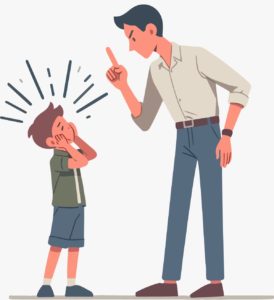 Psychotherapist at The Children’s Hospital, Lorina Richmond Basaiawmoit considers pressure a normal phenomenon and its coping mechanisms varied. She says, “Pressure is a natural phenomenon. Pressure, failure, and criticism are all part of life and that varies from child to child. That attitude and response has to be taught.”
Psychotherapist at The Children’s Hospital, Lorina Richmond Basaiawmoit considers pressure a normal phenomenon and its coping mechanisms varied. She says, “Pressure is a natural phenomenon. Pressure, failure, and criticism are all part of life and that varies from child to child. That attitude and response has to be taught.”
Discipline and Punishment: how much is too much?
Research conducted by the University of Cambridge University and University College of Dublin discovered that children exposed to ‘hostile’ parenting at age three were 1.5 times likelier than their peers to have mental health symptoms which qualified as ‘high risk’. The study further reveals that hostile parenting involves frequent harsh treatment and discipline and can be physical or psychological. It may, for example, involve shouting at children regularly, routine physical punishment, isolating children when they misbehave, damaging their self-esteem, or punishing children depending on the parent’s mood.
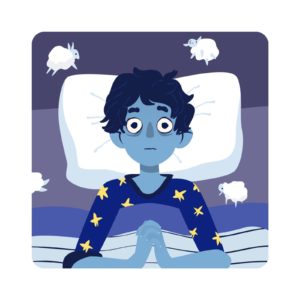 Experts also opine that where parents falter, teachers, guides and counsellors must be vigilant to spot such signs and intervene where necessary by providing them adequate mental and emotional support.
Experts also opine that where parents falter, teachers, guides and counsellors must be vigilant to spot such signs and intervene where necessary by providing them adequate mental and emotional support.
“I find it very difficult to draw a clear line between discipline and punishment. I know that punishment is wrong and it has no value except that children will try to avoid punishment while committing misbehaviour.Discipline should encourage learning from mistakes, not shame or fear, and should be age-appropriate, aimed at helping children develop self-control and empathy.” says, Principal and teacher at St. Edmund’s School, Brother Solomon.
 Having said that, Br. Solomon also believes that a restorative justice approach is needed whereby compassion and empathy are the way to restoring an individual and corporal punishment is a NO.
Having said that, Br. Solomon also believes that a restorative justice approach is needed whereby compassion and empathy are the way to restoring an individual and corporal punishment is a NO.
With an experience of over 23 years, Joydeep Das, concurs, “Disciplining a child from the Gen Alpha age group can be challenging but positive reinforcement is the way to go. Besides, there is no space for physical punishment in our classrooms in particular and schools in general. It leads to fear based relation between the students and teacher. Corporal punishment might have worked in the past but it is a BIG NO in the modern education system.”
 Emphasising on learning desired behaviour early on, Dr. Das says, “It begins early when children can be easily moulded. As a child grows up, it becomes more difficult. As a teacher, I see that often students who go rogue are those that are not corrected early on.”
Emphasising on learning desired behaviour early on, Dr. Das says, “It begins early when children can be easily moulded. As a child grows up, it becomes more difficult. As a teacher, I see that often students who go rogue are those that are not corrected early on.”
A concerned parent, Ericka Lyngwa shares her thoughts, “Parents never wish to see their child go through pain – physical and mental, at home or in school. It is a bond based on trust whether it’s on the child and/or their teachers.”
Basaiawmoit, eases concerns around discipline and suggests, “Parents are at times confused how to enforce a certain behaviour. Whether they should be yelled at or caned, but the idea of the desired outcome should be communicated by implementing a rule that applies to all in the house.”
Dangers of Digital world & social media : how do we tackle it?
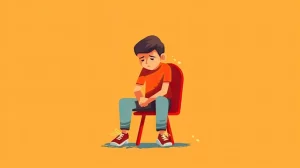 Early and unsupervised exposure to social media and the world of the internet can have a debilitating effect on children. A study conducted by the US Department of Health and Human Services revealed that children and adolescents who spend more than 3 hours a day on social media face double the risk of mental health problems including experiencing symptoms of depression and anxiety. Furthermore, other complex issues such risk of cyberbullying, vulnerability to fall prey to online predators can also be potentially fatal.
Early and unsupervised exposure to social media and the world of the internet can have a debilitating effect on children. A study conducted by the US Department of Health and Human Services revealed that children and adolescents who spend more than 3 hours a day on social media face double the risk of mental health problems including experiencing symptoms of depression and anxiety. Furthermore, other complex issues such risk of cyberbullying, vulnerability to fall prey to online predators can also be potentially fatal.
 Taking cognisance of these issues early on, Br. Solomon had released letters over the past few months to the parents of children of his school bringing to their attention the harsh realities of social media and the urgency of its monitoring amongst parents and caregivers. Br Solomon also makes an interesting correlation between pressure and screen addiction and says, “Most of the pressures are self-induced as many students who do not perform are those who are addicted to screen time. As a result they procrastinate, cannot meet deadlines and are distracted when studying and thus their performance dips. This leads to frustration, low self-esteem, and eventually to give up. It then leads to silent depression and a tendency to drop out of school and life!”
Taking cognisance of these issues early on, Br. Solomon had released letters over the past few months to the parents of children of his school bringing to their attention the harsh realities of social media and the urgency of its monitoring amongst parents and caregivers. Br Solomon also makes an interesting correlation between pressure and screen addiction and says, “Most of the pressures are self-induced as many students who do not perform are those who are addicted to screen time. As a result they procrastinate, cannot meet deadlines and are distracted when studying and thus their performance dips. This leads to frustration, low self-esteem, and eventually to give up. It then leads to silent depression and a tendency to drop out of school and life!”
Based on his observations, Gurung spells out harsh truths and says, “Exposure to the internet is important for children as they can have access to information and learn many new things, if used wisely and under the supervision of parents or elders. But sadly, that is not happening. Children’s excessive usage of mobile/internet has led to a decrease in the level of concentration, and distancing them from real bonds and are beginning to believe the reel to be real.”
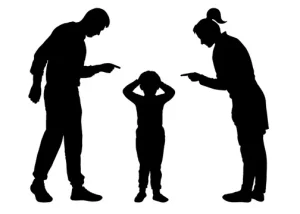 Basaiawmoit agrees, says, “Phone addiction is the same kind of addiction that one has to sugar and drugs because it releases dopamine. Its withdrawal has the same effects leading up to depression and anger issues. From my observations, I often suggest to parents that children do not require personal phones and that they must be raised how children were in the 80s and 90s.”
Basaiawmoit agrees, says, “Phone addiction is the same kind of addiction that one has to sugar and drugs because it releases dopamine. Its withdrawal has the same effects leading up to depression and anger issues. From my observations, I often suggest to parents that children do not require personal phones and that they must be raised how children were in the 80s and 90s.”
Parents, teachers and experts converge at the same point that minimising screen time on gadgets is a sine qua non for children to be able to find a healthy balance between academia, and other activities. But then what is the best kind of parenting-teaching model? Is it a one-size-fits-all approach? As most children remain unaware of their circumstances, and plaguing issues, it is often difficult for them to articulate their feelings and emotions. Thus, vigilance on the part of parents and teachers is critical as well as bridging the mental and emotional gap between each other to provide a safe space for children to find better coping mechanisms.



